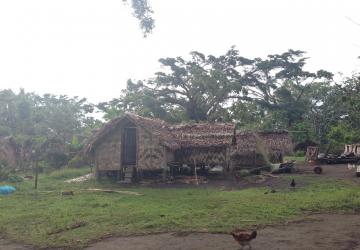Duration of Program:
February 28 - March 11: Mandatory Canvas Program
March 12: Pre-Departure Orientation Session
May 18 - May 22: Study at SFU
May 25 - June 20: Study in Vanuatu
July 11: Final Project due
The Department of Psychology is pleased to offer a field school that focuses on learning the methods and skills for conducting community-engaged social science research. Students will spend one week pre-departure immersed in a Culture and Cognition seminar taught by Dr. Broesch at SFU's Burnaby campus. This course will be an intensive week-long course and students are expected to have completed the readings prior to the start of the course. Students will then spend four weeks in Vanuatu, where Dr. Broesch has established long-term research connections with the Vanuatu Kaljoral Senta and host families on Tanna Island since 2012. Students will spend the first week in Vanuatu living in Port Vila, practicing Bislama, learning about Tanna culture, and developing their research project with community members. The next two weeks will be spent on Tanna Island, first residing in the town at a hotel, and then moving to the host communities where students will spend ten nights conducting and revising the project according to local goals, feedback and general input. The fourth and final week will be spent in Port Vila. Students will conduct analyses and summarize their findings to present back to the community members in an appropriate and community-led manner. For the remaining portion of the summer term, students will have bi-weekly individual or team meetings with Dr. Broesch via video conference to finalize their project.
Field School Director: Dr. Tanya Broesch, tanya_broesch@sfu.ca
This program consists of 10 SFU Units.
Psychology 450-4: Advanced Seminar in Developmental Psychology: Culture and Development
This course will provide students with an introduction to current theoretical debates in the academic field of culture and developmental psychology. Students will read, discuss, and contrast current theories and competing explanations for observed variation in the first few years of life. Students will also discuss the implications for observed commonalities. Special emphasis will be placed on parenting behaviours and socialization practices, however, students will also examine ecological constraints on development. Emphasis will be placed on fostering critical analysis of current theories and methodology, as well as discussing underlying assumptions in the developmental psycholoigcal literature. The overall goal is to examine early child social and cognitive development from an interdisciplinary perspective.
Please note that all course readings are to be completed prior to the start of the summer term.
*For the full course syllabus, please click here.
Psychology 425-3: Field School I
Students will learn about the ethical and practical barriers as well as solutions to conducting research in historically and economically vulnerable populations, specifically, the global south. Students will draw upon a method and research perspective known as ABCD - Asset Based Community Development, wherein the emphasis is on documenting and utilizing the assets in a community and working with the community to design research that is citizen-engaged. Students will read relevant literature in cultural psychology, anthropology as well as international community development. There will be guest lecturers and workshops throughout the course. Students will produce and present a proposed research initiative that incorporates the knowledge obtained in this course as well as practical tools and methods for overcoming research barriers.
*For the full course syllabus, please click here.
Psychology 426-3: Field School II
Students will spend 10 days living and conducting research in Lounikawek village on Tanna island, Vanuatu at the host village of Dr. Broesch's culture and development long-term field laboratory. Students will spend these 10 days integrating into the community, discussing and revising their research project within the community, implementing their research project (developed in PSYC 425), obtaining feedback from the community, and communicating their research back to the community and to the Vanuatu supporting organizations. Students will also write an empirical paper summarizing their research.
*For the full course syllabus, please click here.
*Please note that course syllabi are tentative and subject to change.



